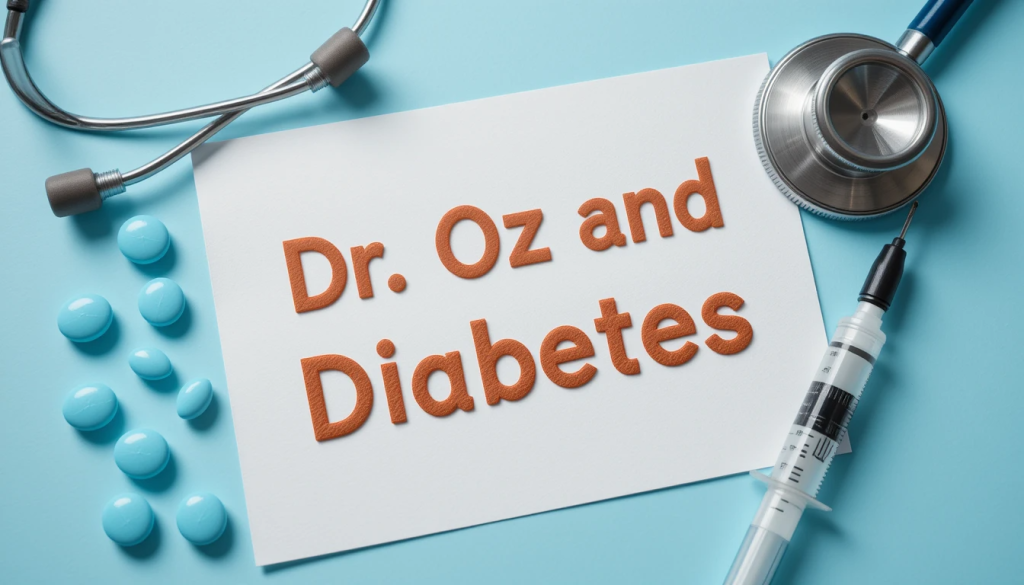Why Dr. Oz and Diabetes Are So Often Linked
If you’ve ever watched daytime TV or scrolled through Facebook health articles, you’ve probably encountered Dr. Mehmet Oz. A cardiothoracic surgeon by training and a household media personality by fame, Dr. Oz is no stranger to bold claims about health and wellness. One condition he often spotlighted is diabetes, a disease now affecting more than 37 million Americans according to the CDC. With such staggering numbers, it’s no wonder audiences perked up when Dr. Oz promoted “blood sugar hacks,” exotic remedies, and alleged cures.
But here’s the catch: diabetes is both complex and chronic. There’s no one‑size‑fits‑all approach, and misinformation can be as dangerous as high blood sugar levels themselves. Patients and families deserve clarity, not confusion.
This guide breaks it all down. You’ll learn:
- What Dr. Oz has actually claimed about diabetes.
- Which myths around diabetes management stem from media hype.
- The facts science strongly supports.
- Steps you can use today to manage or reduce diabetes risk.
- Legitimate research on potential future “cures.”
By the end, you’ll be equipped to confidently separate hype from help—and maybe even chuckle at how persistent those “miracle cure” headlines can be.
What Has Dr. Oz Said About Diabetes?
Why does Dr. Oz talk so much about diabetes?
Diabetes is not just a medical condition—it’s a societal challenge. It costs the U.S. $327 billion annually in medical expenses and productivity losses. It makes sense that a mainstream figure like Dr. Oz would spotlight it frequently. On his show, diabetes usually entered the spotlight in segments like:
- “Superfoods” for healthy blood sugar (cinnamon, green tea, apples, beans).
- Supplements claimed to regulate glucose.
- Integrative health strategies combining traditional medicine with natural remedies.
For many viewers, this was their first introduction to thinking about diabetes beyond insulin needles or doctor’s visits.
How have his claims been received?
Mixed would be an understatement. His popularity skyrocketed because he simplified concepts, brought urgency, and highlighted practical lifestyle shifts. But critics—including the British Medical Journal and the U.S. Senate Consumer Protection panel—have accused him of overstating benefits and presenting premature findings as established science.
So while Dr. Oz deserves credit for raising awareness, his approach sometimes blurred the line between education and entertainment marketing.
Common Myths About Diabetes
Myth 1 – “There’s a quick cure for diabetes.”
Dr. Oz occasionally presented discoveries with phrasing that sounded like revolutionary cures. Unfortunately, as of now:
- Type 1 diabetes remains incurable because it’s autoimmune. People with type 1 will continue requiring insulin.
- Type 2 diabetes may improve drastically or even enter remission, but this requires sustained weight loss, diet adjustments, and exercise—no short‑cuts exist.
Truth bomb: think of remission more like “quiet mode,” not a full exit from the disease.
Myth 2 – “Supplements alone can manage diabetes.”
Cinnamon, turmeric, bitter melon extracts—these make frequent appearances on health shows. Some evidence does suggest these can slightly support insulin sensitivity, but the effects are:
- Modest, not transformational.
- Inconsistent across studies.
- Secondary to mainstream treatments like metformin, GLP‑1 receptor agonists, SGLT2 inhibitors, and insulin.
Myth 3 – “Carbs are the enemy.”
Carbohydrates are painted as villains, but the nuance is this:
- Refined carbs (white flour, soda, added sugars) spike blood sugar quickly.
- Complex carbs (quinoa, oats, legumes) absorb more slowly, providing steady energy and fiber.
Eliminating all carbs can be unsustainable and nutritionally imbalanced. Quality and portion control—not carb‑extermination—are the keys.
Myth 4 – “Family history means diabetes is unavoidable.”
Yes, genetics raise risk. But environment plays a crucial role:
- Weight, diet, physical activity, and stress reduction all influence outcome.
- The Diabetes Prevention Program showed lifestyle coaching cut risk of developing type 2 diabetes by over 58%.
So no, family history isn’t a prophecy carved in stone—it’s a warning sign you can outsmart.
Facts Backed by Science
What actually works for prevention and management?
1. Weight Management
- Losing 5–10% of body weight reduces risk markers dramatically. Think of losing just 15 pounds if you weigh 200.
2. Diet
- Prioritize: whole foods, vegetables, lean proteins, legumes, nuts, unsweetened dairy.
- Limit: highly processed snacks, sugary beverages, refined carbs.
- Fun fact: Even switching your morning glass of juice to water can shave off hundreds of sugar grams per week.
3. Exercise
- 150 minutes weekly (about 30 minutes, 5 times a week).
- Mix aerobic activity (walking, swimming, cycling) with resistance training (weights, bands, bodyweight exercises).
4. Medical Monitoring
- HbA1c tests track average blood sugar over 3 months.
- Regular checkups help prevent complications (kidneys, eyes, nerves).
5. Stress and Sleep
- Stress hormones spike blood sugar. Meditation, yoga, or even light stretching before bed can reduce glucose variability.
Can diabetes really go into remission?
Yes—in type 2 diabetes, significant research shows it’s possible.
- The DiRECT trial in the UK (2017): patients on intensive calorie‑restricted diets lost up to 30 pounds, leading to remission in nearly half of cases.
- Bariatric surgery often produces remission, though it’s not risk‑free and not for everyone.
Takeaway: remission is possible, but it requires ongoing commitment to lifestyle shifts. Stop the diet, and blood sugar often rebounds.
Potential Future “Cures” That Are Actually Promising
1. Beta‑cell regeneration
Scientists are exploring drugs and biotechnologies that stimulate the pancreas to regrow insulin‑producing beta cells.
2. Immunotherapy for Type 1
New therapies like teplizumab (FDA‑approved in 2022) delay type 1 onset by targeting immune responses. Early detection combined with such therapies could drastically reduce lifelong impact.
3. Artificial pancreas systems
Closed‑loop devices combine glucose monitors and insulin pumps. Already available commercially, these provide smoother control—essentially automating what a pancreas should do.
4. Stem cell therapies
Companies are developing stem cell‑derived insulin‑producing implants. Early trials show transplant patients producing insulin for the first time in years.
5. Genetic editing
Still experimental, CRISPR and similar technologies may eventually rewrite some genetic predispositions.
So while Dr. Oz leaned on “miracle cure” teas, serious labs are investing billions into therapies that may change the game in the next decade.
Practical Steps for Navigating Health Advice Online
How to spot red flags in “cure” claims
- Urgency marketing: “Doctors don’t want you to know!”
- No sources cited: If there’s no reference to ADA, CDC, NIH—pause.
- Overreliance on testimonials instead of peer‑reviewed data.
- Product tie‑in: If stage one is hearing a bold claim and stage two is buying a supplement within 30 seconds, beware.
FAQs
Q1: Can type 2 diabetes be cured?
Not cured—but remission through diet, weight loss, and exercise is possible.
Q2: What did Dr. Oz recommend?
Foods, supplements, lifestyle hacks—though many weren’t rigorously tested.
Q3: Is cinnamon a cure?
No. It may mildly improve insulin sensitivity, but it cannot replace treatment.
Q4: Can losing weight reverse diabetes?
Yes—in some patients, especially if weight loss is rapid and sustained.
Q5: Is type 1 reversible?
Not yet, but immunotherapy and stem cell innovations are very promising.
Q6: Should I trust supplements promoted on TV?
Only after talking with your doctor—some can interfere with meds or liver function.
Conclusion
Dr. Oz made diabetes a household talking point, which deserves some credit. Yet many of his so‑called quick fixes oversimplify or exaggerate what science supports. That doesn’t mean there’s no hope—far from it. The evidence is clear: healthy lifestyle changes, routine monitoring, and appropriate medication make a huge difference, even leading to remission in many cases of type 2 diabetes. And the future? Very bright, with stem cells, artificial pancreas devices, and genetic therapies on the horizon.
The key skill today is discernment. Learn to separate hype from help by seeking guidance from certified professionals and organizations with authority, not from flashy TV claims. If this article cleared up confusion for you, share it with your network. Someone else drowning in diabetes misinformation might just need the same reassurance: the path forward isn’t about chasing miracles—it’s about building healthy habits with science on your side.

